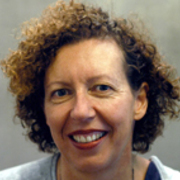
Bridget Ikin
Born in Lower Hutt, Bridget Ikin went on to study English Literature at Auckland University. Later she got an MA in English 18th Century studies at London University. Since 1990 Ikin has been based in Australia.
Initially keen to become an actor, Ikin would instead make her mark as a producer. From her first short films in the early 1980s, she began a habit of championing emerging filmmakers who were exploring personal material.
Ikin jumped into producing via the deep end — producing 1985 anthology series About Face with her partner John Maynard. The collection of half-hour dramas provided a showcase for a new generation of filmmakers, including Alison Maclean, Gregor Nicholas, Peter Wells, and Stewart Main. But first Ikin and Maynard had to sift through roughly 150 script ideas, trying to find non-racist, non-sexist ideas that might suit a half-hour running time. "Seven very interesting films came out of it," says Ikin. "and seven careers were launched as a result of it — pretty amazing".
Ikin first worked together with director Alison Maclean on experimental short Taunt, begun while Maclean was studying at Elam Arts School. They followed it with "ironic comedy" Rud's Wife, then 48 minute long drama Talkback, which is set late in a radio station overnight. Talkback won a Listener Award for Best Short, as did follow-up Kitchen Sink, whose budget allowed the chance to "dream big". Kitchen Sink became one of the most successful shorts yet made in New Zealand. The moody tale of something strange emerging from the plughole became the first Kiwi short invited to compete at the Cannes Film Festival in 1989. It also screened in Los Angeles at a retrospective of Sundance standouts.
Ikin went on to produce McLean's debut feature Crush (1992), a dark drama of simmering sexuality and friendship set in Rotorua. Again it was invited to compete at Cannes. Ikin argues that the film explored "a sense of anxiety around Māori Pākehā relations", at a time when few had the courage to go there. It proved to be a memorable year for Ikin — she was pregnant through much of the project.
By then, Ikin and John Maynard had co-produced Jane Campion's widely acclaimed adaptation of writer Janet Frame's autobiography, An Angel At My Table. It took Ikin two years to win funding; Ikin recalls that the NZ Film Commission ultimately put money into the project based on it having local worth, with little expectation of it winning an international audience. Although intended to screen on television, Campion ultimately agreed to let it screen in cinemas. An Angel at My Table won the Silver Lion and an extended standing ovation at the 1990 Venice Film Festival, and "an incredible theatrical life all over the world".
Ikin went on to work on Anglo-Kiwi co-production Loaded (1995) — the only feature directed by Jane Campion's sister Anna — and Hong Kong visits Australia comedy Floating Life, which won the Silver Leopard at Locarno in Switzerland.
From 1996 until 2000, Ikin was the General Manager of SBSi, the commissioning arm of Australian public broadcasting network SBS. There she was responsible for over 400 hours of programming, including animation, documentary and features. She was the prime mover behind Unfinished Business: Reconciling the Nation, a week long series of dramas, documentaries and live coverage on SBS in May 2000. The project ran alongside a series of events aimed at apologising for past treatment of Australia's indigenous peoples.
Two years later, working alongside the Adelaide Festival of the Arts, Ikin negotiated public funding for a series of low budget features, all of which she executive produced. The titles included Rolf de Heer's multi award-winning The Tracker, starring David Gulpilil as an Aboriginal tracker leading three white policemen through the outback, contemporary racial drama Australian Rules, and ensemble drama Walking On Water.
Impressed by Australian writer/director Sarah Watt's animated shorts, Ikin went on to produce Watt's first feature, tragicomedy Look Both Ways (2005). It won the Discovery Award at the 2005 Toronto Film Festival and several Australian Film Institute gongs, including Best Film and Best Director. The two collaborated again for acclaimed 2009 drama My Year Without Sex.
In 2010, Ikin was invited to produce the first of two seasons of Art + Soul, which explored contemporary art by Aboriginals and Torres Strait Islanders. The series was directed by Warwick Thornton, who had recently won acclaim with his debut feature Samson and Delilah.
In 2015 Ikin produced feature Sherpa with Brit John Smithson. It was nominated for multiple Best Documentary awards, including a BAFTA. Overtaken by events which occured while it was being made, the film follows sherpas reappraising their relationship with Westerners climbing Mount Everest, after a tragic 2014 accident on the mountain.
In the same period Ikin reunited with Alison Maclean for Kiwi project The Rehearsal. Based on the novel by Eleanor Catton (The Luminaries), it follows students caught up in creation and scandal at drama school. The Rehearsal won many positive reviews, and a nomination for Best Film at the 2017 Moa Awards. Ikin produced with Trevor Haysom.
Alongside her own company Hibiscus Films, Ikin has also established Felix Media with John Maynard, to create screen projects which offer "memorable and provocative insights into the way we view our world, our times and ourselves".
Updated on 30 November 2018
Sources include
'Bridget Ikin: A champion for diversity and authenticity...' (Video Interview) NZ On Screen website. Director Andrew Whiteside Loaded 14 November 2018. Accessed 14 November 2018
Felix Media website. Accessed 30 November 2018
Hibiscus Films website. Accessed 30 November 2018
Felicity Collins and Therese Davis, Australian Cinema After Mabo (2004: Cambridge University Press)